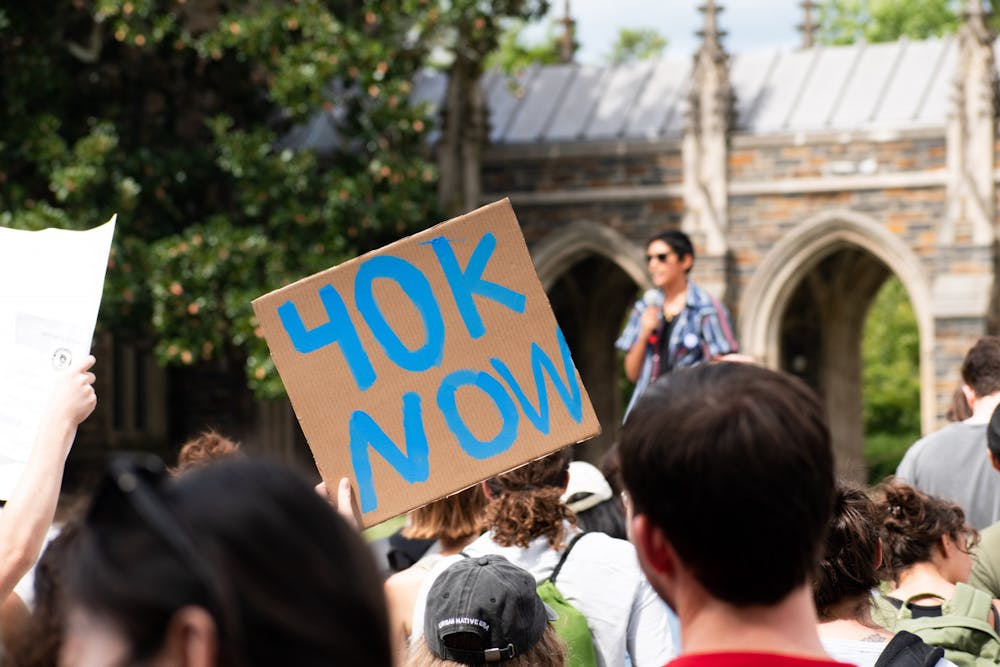The National Labor Relations Board approved the Duke Graduate Students Union’s petition for a union election, rejecting Duke’s challenge to a 2016 NLRB case classifying doctoral students as employees with the right to unionize.
Approximately 2,500 doctoral students who “hold or have held a unit position” during spring 2023, fall 2022 or spring 2022 will be mailed ballots on July 24. Members of the union’s unit include all doctoral candidates at the Graduate School employed by the University to teach or provide research services.
Ballots will be counted on Aug. 22.
"We’re excited that we finally get to vote. It’s a bummer that it’s over the summer since so many of our coworkers are traveling for work or have moved since the spring," wrote Lauren Jenkins, DGSU co-chair and second-year doctoral student in ecology at the Nicolas School of the Environment, in a message to The Chronicle. "[W]e could’ve had an election in the spring but it was pushed back when Duke decided to challenge the rights of grad workers across the country to unionize."
Lisa Henderson, regional director for Region 10 of the NLRB, wrote in her decision that the facts of the case have not “changed significantly” since the Region’s initial finding in 2017, when the DGSU held its first unionization drive. In doing so, Henderson rejected the University’s challenge against a 2016 NLRB decision affirming that doctoral students were employees with the right to unionize.
“Our Ph.D. students are not admitted to do a job; they are selected because of their potential to be exceptional scholars,” wrote Chris Simmons, then interim vice president for public affairs and government relations, in a statement to The Chronicle at the time of the challenge. Provost Jennifer Francis also wrote in March that Duke’s relationship with its doctoral students was “fundamentally different from that of employer to employee.”
Henderson found that Duke invests “substantial resources” in training students to “teach well and research effectively,” and that serving as a teaching assistant, grader or research assistant was an “integral part” of doctoral students’ training and often “in furtherance of and even essential to their dissertations.”
The decision found that despite the “variety of funding” provided to graduate students unrelated to their work as teaching or research assistants, students serving in these capacities are still “performing services for the university, many of which are also performed by paid faculty members, staff, and non-PhD students.”
“Duties are referred to as ‘work,’ and although the Employer may prefer the term ‘service,’ those duties are mandatory,” Henderson wrote.
Henderson pointed to how doctoral students teach or assist in undergraduate courses and research laboratories, performing tasks that non-student staff or a faculty member would otherwise perform.
The ruling refers to introductory language courses in the department of romance studies, which are all taught by doctoral students and adjunct faculty. It also notes that 34 of 52 fall 2016 100-level courses in the department of mathematics were taught by doctoral students, even though teaching is not a requirement in the department to obtain a Ph.D.
The DGSU filed for legal certification in March after launching its union campaign in September. It previously filed for a NLRB-certified election during its initial unionization drive in 2017, but withdrew its petition after 502 of its ballots were contested and operated as a direct-join union without NLRB recognition.
If the DGSU is successful, the University would be required to recognize the union as the exclusive bargaining body for its doctoral students. The union would be the first NLRB-recognized graduate student union at a private university in the South.
The University declined to comment on the ruling.
This story was updated Monday night to include that the University declined to comment on the ruling and updated Tuesday morning with the DGSU's comment.
Get The Chronicle straight to your inbox
Sign up for our weekly newsletter. Cancel at any time.

Audrey Wang is a Trinity senior and data editor of The Chronicle's 120th volume. She was previously editor-in-chief for Volume 119.

